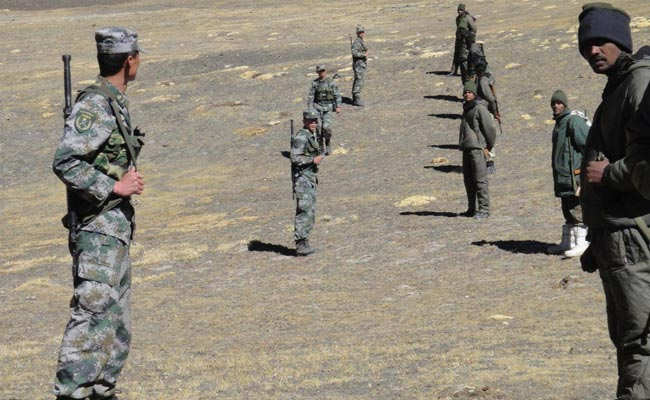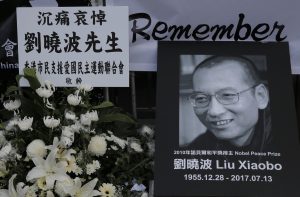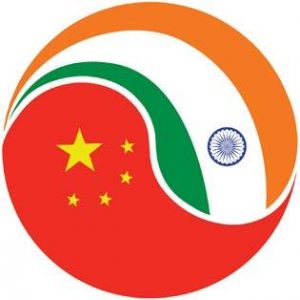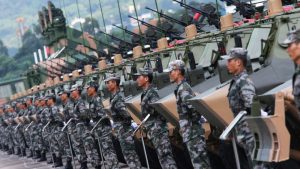https://bharatshakti.in/slaying-the-dragon-unrestricted-warfare/





Image Courtesy: NDTV
Editor’s Note
The brash Chinese posturing in the South China Sea and Dokalam near the Tri Junction of China, Bhutan and India is a cause for concern for the countries in the region. In fact, Southeast Asian countries are awaiting the final outcome of the confrontation at Dokalam.
The author’s answer to Chinese belligerency draws a few cues from the book Unrestricted Warfare written by a duo of Chinese army officers. In this article, the author recommends exploiting the high handedness of Beijing’s leadership and the resultant non-fulfilment of aspirations of Chinese people. There are also other areas that he identifies, which if exploited, could definitely help create unfavourable conditions for the Chinese
SLAYING THE DRAGON: UNRESTRICTED WARFARE
Qiao Liang and Wang Xiangsu authored the famous book “Unrestricted Warfare”. As per Qiao the first rule of unrestricted warfare is that there are no rules, with nothing forbidden. The book propagated hacking into websites, targeting financial institutions, terrorism, using media and law, conducting urban warfare and more to carry out unrestricted warfare against USA. What goes around comes around. So, a question popped up in my mind. What would be the tenets of Unrestricted Warfare against China? As China continues to behave like a super-bully, sooner or later, someone or more will convert these tenets into practise. As will be seen, it is quite simple – the ways and means have been laid out by China itself!
Let’s start with my only rule (fully borrowed and acknowledged)
There are no rules!
Democracy

Image Courtesy: Peace and Freedom
Any country which lives under the yoke of an authoritarian rule remains vulnerable to the idea of Democracy. That has been the history of mankind. The seeds of great revolutions: the French, American and Russian, were the idea-bugs of democracy which eventually overthrew authority. The recent examples of authoritarian regimes biting the dust are the collapse of USSR and the Arab Spring. Is China different? As Tiananmen did show, China is most vulnerable to the very idea of Democracy. Find the next Chinese equivalent of Gorbachev or Yeltsin. Support the idea of a Chinese Glasnost and Perestroika. China as we know it now, might then collapse without a bullet being fired! One inspired idea can lead China into taking the Great Democratic Leap. Historically, the rise and fall of Chinese dynasties tell you that this Chinese phase is also finite in time. The more China resists democracy, the greater will be the vulnerability
Religion and Spirituality
The adjunct to democracy is religion and spirituality. The Chinese government has been atheistic since the days of its Great Leap Forward. For a long time, the Communists forced atheism on its people. Religion was supressed but could never be extinguished. God, I suppose, has greater power than Communists. Slowly religion and spirituality are resurfacing. The Communists are trying to control the spread and importance of religion and spirituality. Can they succeed beyond a point? Religion and spirituality are endemic to mankind. People being people, once the genie of religion is out of the bottle – it is uncontrollable. The Falun Gong movement (still banned), spread of Buddhism, rise of Islam, spread of Christianity, resurfacing of Taoism are all indicators of the coming storm. Slowly but surely they will all grow, compete and create tension. Religion and politics can be separated to a point when religion will trump over autocratic politics. All one must do is inject strength into the growing religious structure of China for an auto-conflagration.
Human Rights
If there is one major power where there is a deficit of human rights it is China. Chinese government routinely denies justice, labour rights, gender equality, access to unbiased and free media (social or normal), fundamental rights and other basic rights to its people. Freedom of expression is a very dangerous freedom in China to be enjoyed only by people in power. State purges are common. Their dismissive attitudes towards Nobel laureate like Liu Xiaobo and Dalai Lama indicates a regressive mentality. The control of the state apparatus over one fifth of humanity on what it can do and not do is a major fault line. As per Chinese thinking – any ‘major criminal gang’ aiming to ‘attack social stability and order’ with the help of ‘foreign forces’ must be severely dealt with. Human Rights issues of China is a clear line of unrestricted warfare for ‘foreign forces’. A combination of religion, human rights and democracy can be terminally lethal.
Stretch China
Politically make China look East and Westwards simultaneously. Eastwards it has problems in Taiwan and the South China Sea littoral. Add the US presence there and the mix is heady, handful and growing. It lacks experience in dealing with emerging situations and recent problems of its West. A Maoist kind of ham-handed approach will only exacerbate the politics there – whether in Tibet, East Turkestan (Xinyang) or Inner Mongolia. This political stretch is largely self-induced due to its over aggressive and non-compromising attitude with its minorities and neighbours. Economically, the country has started slowing. It needs mega projects like the Belt and Road Initiative (BRI), to sustain its economy. If BRI becomes costly or is made to be costly, China will bleed. Wherever China has gone with its moneybags, there has been a poor aftertaste: Sri Lanka, Africa, Venezuela and Myanmar. China has already started worrying about the political developments in Pakistan and its fallout on the China Pakistan Economic Corridor (CPEC). The wheels have already started turning to ask the question – has the economic stretch already begun with its mega commitments to OBOR? If OBOR fails, China will be in trouble.
Trade Barriers

Image Courtesy: IPRA
China depends heavily on trade. It is not a consumption driven economy. Conversion to a consumption driven economy needs considerable social and structural change internally. If it does not export, an inflection point will be reached when its economy starts contracting. If major markets set up barriers and trade volumes are affected, a negative spiral can commence. A host of nations will slowly but surely put impediments for Chinese businesses. In a decelerating scenario, there will be flight of capital from China. Consequences for China will be serious. Consider this – if recipient countries set up social / peoples campaigns to ignore Chinese goods, China will then learn what peoples’ will is all about. It could lead to a hard landing of the Chinese economy.
Unrest in Outlying Areas
Less than 10% of the population lives in its outlying areas of Tibet, East Turkestan and Inner Mongolia. These areas constitute more than half of the entire area of China. Hong Kong and Macau can also be considered as outlying areas since they are not fully integrated with the homeland. All outlying areas have problems, since historically, they have never been part of China. They have been under Chinese control/ suzerainty whenever the ruling dynasty was rising. When dynasties faded, these areas have always raised their little flags of independence. Even now they are raising their flags of independence – Tibet and East Turkestan surely. Inner Mongolia and Hong Kong have problems with the mainland. There are already low-level insurgencies in these areas. These could be encouraged to grow to full blown insurgencies. Pakistan, its client state, will export Islamic Extremism free of cost into China. Taiwan will become a major-major issue for China, if it declares independence. Problems in the South China Sea littoral have exacerbated with South Korea, Japan, Indonesia, Vietnam, Malaysia and Philippines contesting its unilateral actions. In fact, South China Sea is the latest addition to its outlying areas by forceful stretching of claims. This will further stretch it militarily. Can China balance itself militarily, economically and politically when stretched? Can imbalance be induced?
Energy Security
China needs more energy than it will ever have. It will remain energy dependant. It will never be an energy rich super power like USA is or USSR was. Bleeding China to pay more for its energy will be a major line of action for any kind of unrestricted warfare against it. Focus must be on raising costs for China to secure its vulnerable energy sources and lines. As China establishes outposts to secure its energy chain, its security chain becomes vulnerable. I do not visualise any conventional attack on this chain. It could be a series of sub conventional attacks which will keep increasing the costs for China.
Multilateral Arrangements vs Unilateralism of China
One of the biggest problems with China is that it has no friends. It has no security alliance barring with Pakistan and North Korea. All its fora are economic. Militarily, it is doubtful if there is anyone who will stand by it. Already there are indications of strategic alliances which are being formed between powerful countries. Their combined clout could be a little too much for China to handle. So, the multilateral arrangements of other countries vs the unilateralism of China is a huge channel of unrestricted warfare. The fundamental problem of China comes to the fore in this context. There is a major trust deficit between China and others. This trust deficit generally gets bridged by Soft Power, which China simply does not have. Invariably it will be China vs the Rest.
Social Factors
There are many social factors which can be exploited. The richest 1 % own 1/3rd wealth. The poorest 25% own less than 1% wealth. Approximately, 82 million people live on less than 1.25 dollars a day whereas there are 2.4 million millionaires. For a hard-communist country, till the last generation, such huge income disparities are fissures, which can develop into social cracks. The next is regional disparity between the developed East which represents the Han core vs the under-developed West, which represents the minorities. The third factor is age disparity due to a rise in aging population vs the lack of youth due to their very successful and erstwhile one child policy. Can Chinese replicate the human wave tactics which they used to employ in wars of the yore like cannon fodder? Today in any hard fought and long-lasting campaign there could be a price to pay for the future. If youth is sacrificed in wars, China might be heading to be an old age home.
Untested in Sub-Conventional Warfare

Image Courtesy: South China Morning Post
China has not been tested significantly by sub conventional warfare, terrorism, insurgency, religious extremism, hijacking, massacres et al unlike the West, Middle East, Africa, South Asia and most major powers. Chinese mettle will be tested when faced with such problems. China is untested by blood shedding in the past three decades. Are Chinese prepared to sacrifice the way others have done? If they do so, the learning curve will be steep. If they don’t, it will be steeper. With Chinese footprint increasing and China establishing bases all over; with China trampling all over it is only a matter of time when matters will come to a head. In any case China should know that Super Power status does not come with economic and military might. It comes with putting money and blood on the ground as has been demonstrated by other super powers. Will the Chinese do so? Can they be pushed into it? Remember – there are no Rules!
What Next?
All facets of unrestricted warfare are force multipliers which must be used in synergy with conventional hard power. Formulations and execution may vary. An Indirect Approach as propagated by Liddel Hart will give best results. Is it feasible to carry out such unrestricted warfare against China? Of course, yes. A retrace of Chinese behaviour of the past decade indicates that arrogance, brashness and self-centeredness has been on the rise. Many countries are now feeling the Chinese pinch and will be itching to retaliate. There are also views that China is already a Superpower. So, what? There is a price to pay for being a superpower. Being a superpower does not give it immunity from being subjected to unrestricted warfare. After all, if it can propagate a theory of unrestricted warfare against USA when it was not yet a superpower, why can’t others do the same to it? Will others do the same to it? It is a matter of time. Will China survive unrestricted warfare against it? Of course, it will. China is a great civilisation and it won’t just disappear. However, it is unlikely to do so in its present form. If China changes its course-who can tell? Will China change its course? The question needs to be posed to Xi.
It takes an idea to spark a revolution.
Lt Gen P R Shankar (Retired)
(Disclaimer: The views and opinions expressed in this article are those of the author and do not necessarily reflect the official policy or position of BharatShakti.in)

Comments
Post a Comment